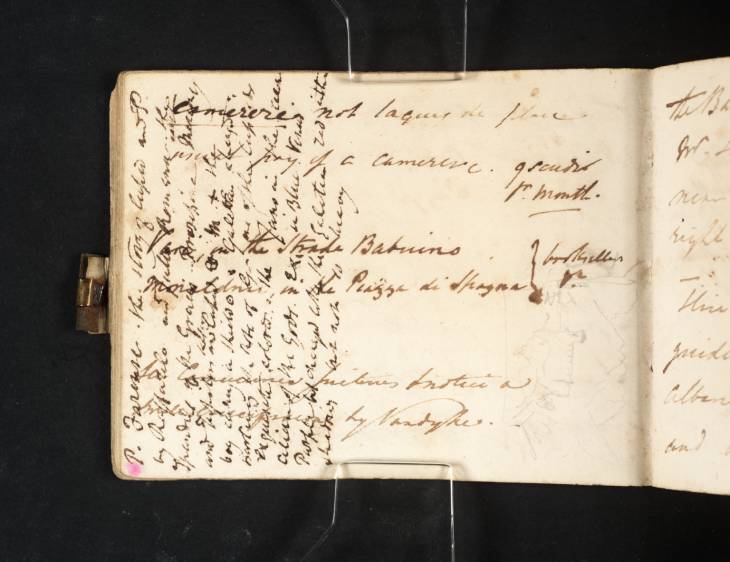Joseph Mallord William Turner Critical Notes by Turner on the Frescoes in the Villa Farnesina, Rome, and a Sketch of a Castle Amidst Mountains; Also Notes by James Hakewill on Rome 1819
Joseph Mallord William Turner,
Critical Notes by Turner on the Frescoes in the Villa Farnesina, Rome, and a Sketch of a Castle Amidst Mountains; Also Notes by James Hakewill on Rome
1819
Joseph Mallord William Turner 1775–1851
Folio 14 Verso:
Critical Notes by Turner on the Frescoes in the Villa Farnesina, Rome, and a Sketch of a Castle Amidst Mountains; Also Notes by James Hakewill on Rome 1819
D13884
Turner Bequest CLXXI 14 a
Turner Bequest CLXXI 14 a
Black ink and pencil on white wove paper, 114 x 88 mm
Inscribed by the artist in black ink (see main catalogue entry)
Inscribed by James Hakewill in black ink (see main catalogue entry)
Inscribed by James Hakewill in black ink (see main catalogue entry)
Accepted by the nation as part of the Turner Bequest 1856
References
1909
A.J. Finberg, A Complete Inventory of the Drawings of the Turner Bequest, London 1909, vol.I, p.497.
1925
Thomas Ashby, Turner’s Visions of Rome, London and New York 1925, p.10.
1969
John Gage, Colour in Turner: Poetry and Truth, London 1969, p.94.
1974
Martin Butlin, Andrew Wilton and John Gage, Turner 1775–1851, exhibition catalogue, Royal Academy, London 1974, p.92.
1984
Martin Butlin and Evelyn Joll, The Paintings of J.M.W. Turner, revised ed., New Haven and London 1984, p.137 under no.228.
1984
Cecilia Powell, ‘Turner on Classic Ground: His Visits to Central and Southern Italy and Related Paintings and Drawings’, unpublished Ph.D thesis, Courtauld Institute of Art, University of London 1984, pp.151 note 2, 152 note 8, 153 notes 9, 405, 485 note 13.
1987
Cecilia Powell, Turner in the South: Rome, Naples, Florence, New Haven and London 1987, pp.65 and 203 note 4.
1997
James Hamilton, Turner: A Life, London 1997, p.199 note 17.
2011
Nicola Moorby, ‘Turner’s Sketches for “Rome from the Vatican”’: Some Recent Discoveries’, Turner Society News, no.115, Spring 2011, pp.4, 10 note 7.
This page contains an inscription by James Hakewill (1778–1843), part of his advice to Turner on travelling in Italy in preparation for the artist’s first tour of the country in 1819 (see the introduction to the sketchbook). The text, which relates to locations in Rome, was first transcribed by Finberg,1 but more correctly so by Thomas Ashby,2 and reads:
Camerere not laquis de place.
usual pay of a camerere, 9 scudi
pr month.
Vari, in the Strada Babuino } booksellers
Monaldini, in the Piazza di Spagna } &c.
See Camuccini’s pictures and notice a | small crucifixion by Vandyke. –
usual pay of a camerere, 9 scudi
pr month.
Vari, in the Strada Babuino } booksellers
Monaldini, in the Piazza di Spagna } &c.
See Camuccini’s pictures and notice a | small crucifixion by Vandyke. –
‘Cameriere’ is the Italian word for waiter, whilst a ‘laquais de place’ was a local servant, often hired by travellers during a stay in a foreign country. In addition to providing Turner with the names of booksellers near the Spanish Steps, an area popular with English tourists, Hakewill also advises that he visits the pictures of Vincenzo Camuccini, (1771–1844), one of the pre-eminent academic painters in Rome at this period. Further lists of places of interest in Rome can also be found on folios 35 and 35 verso (D13924 and D13926).
In addition to Hakewill’s writing, Turner has also used the left-hand side of this page to make extensive critical notes on frescoes in the Villa Farnesina. This sixteenth-century house (now the Accademia Nazionale dei Lincei), stands near the banks of the River Tiber in Rome’s Trastevere district, at the foot of the Janiculum Hill and is famous for its fresco decorations commissioned by Agostino Chigi (1466–1520). The artist’s comments relate to the parts of the villa decorated by Raphael (1483–1520) and his follower, Giulio Romano (circa 1499–1546), particularly the Loggia di Psyche and the Triumph of Galatea. The text was first fully transcribed by Cecilia Powell,3 and the inscription is repeated here with only minor variations:
P. Farnese. the story of Cupid and P. | by Raffaello and Julio Romano the | Spandels of the Graces .. Proserpina Mercury | and Jupiter and ^[?...]^Cupid [cross encircled] M + the | boy carrying a shield [dot encircled] + Galetea changed: | [?painting] of Robe of G – one of the Cupids | exquisite colored. the Juno in the recon | ciliation of the Gods Ex. in Blue. Venus | Purple but changed like the Galetea red with | shadows but not so heavy
As Powell has discussed, Turner has categorised some of the frescoes using a three-tiered shorthand system: a blank circle; a dot in a circle; and a cross in a circle.4 The respective values of each category are still unknown but the observations are evidence of Turner’s appreciation of Raphael as a colourist.5 Sketches relating to the Villa Farnesina can be found in the Italian Guide Book sketchbook (Tate D13935, D13985, D13987; Turner Bequest CLXXII 2, 28a, 29a).
Also on the page, Turner has made a small, rough pencil study of an unidentified building or castle amidst mountainous scenery.
Nicola Moorby
March 2010
How to cite
Nicola Moorby, ‘Critical Notes by Turner on the Frescoes in the Villa Farnesina, Rome, and a Sketch of a Castle Amidst Mountains; Also Notes by James Hakewill on Rome 1819 by Joseph Mallord William Turner’, catalogue entry, March 2010, in David Blayney Brown (ed.), J.M.W. Turner: Sketchbooks, Drawings and Watercolours, Tate Research Publication, December 2012, https://www

